Coronavirus lockdown in India: ‘Beaten and abused for doing my job’
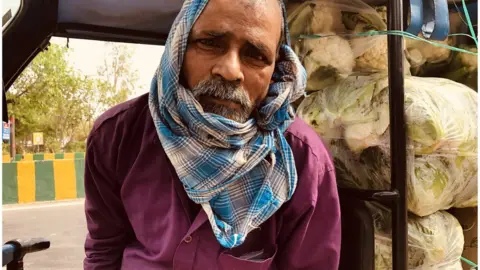 BBC
BBCIndia's prime minister, Narendra Modi, suddenly announced on 23 March that the entire country would be put under lockdown. This left many delivery services and vendors of essential services unprepared, leading to confusion and clashes between police and their staff in many areas. The BBC's Vikas Pandey reports.
Suresh Shah and his brother, Ramprasad, have been selling vegetables in the Delhi suburb of Noida for more than 15 years.
Their daily routine involves picking up vegetables from a wholesale market in the morning and then selling them in their small carts in the evening.
It's a standard day for millions of vegetable sellers across the country. But on Tuesday, the brothers' routine was brutally broken.
'Hit so hard I'm struggling to sit'
The brothers picked up their vegetables at 06:00 and reached their homes an hour later. They stocked their carts and went out that evening as usual.
But almost immediately, police officers approached their cart and started shouting at them using abusive language.
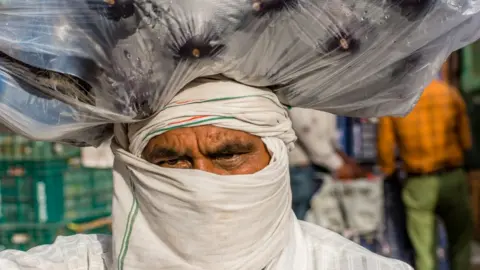 Getty Images
Getty ImagesSuresh tried to explain, but before he realised what was happening, one of the policemen hit him hard with a baton. He was struck a few more times and then forced to pack up his cart and leave.
It meant a loss of around 3,000 rupees ($40; £32) because he couldn't sell anything.
"I was hit so hard that even today I am struggling to sit. But what hurts even more is that it was a huge loss for me as I only make around 300 rupees every day in profits," he said.
Vegetable sellers like him were "used to harassment by the police", he added.
"But this time they beat us up when we were genuinely trying to help. I know the risk of coronavirus and that is why our role is more important now than ever," he added.
His brother said they took a break for a day and returned to the market.
"We need to go out and make money for our families. But more importantly, people need supplies and we are helping them stay indoors. We need support and not beatings and abuses," said Ramprasad Shah.
'We're not the enemy here'
Their story is not unique. Similar incidents were reported in several states in the days immediately following the lockdown. Delhi police even suspended one officer who allegedly beat up a vegetable seller.
But quite apart from police, vendors have also faced harassment from Resident Welfare Associations (RWA) - non-government local groups that look after the upkeep of neighbourhoods and housing societies.
Rajesh Kumar was told by an RWA that he couldn't sell fruits in the colony.
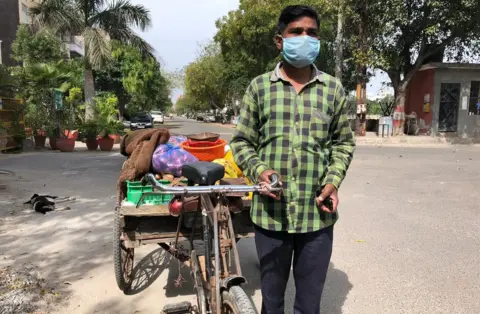
"Some people told me that I go to crowded wholesale vegetable markets and I may have picked up an infection. But the same people also want door-step delivery at their houses. Why are we being treated like this?" he asked.
"We are trying to help people stay indoors. We are not the enemy here."
Lockdown breaks link in supply chain
Vendors like Rajesh and the Shah brothers are the backbone of India's supply chain of essential goods, especially in small towns and villages.
They bring vegetables, fruit, grain, bread and milk to millions of houses every day. But the lockdown has broken this crucial link in the supply chain.
For the 21-day lockdown period to be a success, this network of doorstep sellers needs to work and know how to be protected against the virus.
A number of state governments have announced that vendors will get passes, warning police not to stop them going about their business.
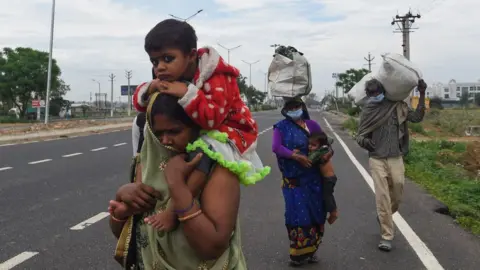 Getty Images
Getty ImagesHC Awasthy, chief police officer in India's most populous state, Uttar Pradesh, told the BBC that "this is an unprecedented challenge".
"There were a few stray incidents in the first two days. We largely enforced the shutdown peacefully. Policemen have been told to be calm and patient with people. This situation is new for everybody," he said.
His force's top priority, he said, was to "work with district administrations to ensure people are getting essentials".
"We have to avoid mass gatherings anywhere - be it a shop, a bank or any other place. We are in this together, so I urge people to to be patient with the police as well."

- A SIMPLE GUIDE: What are the symptoms?
- AVOIDING CONTACT: Should I self-isolate?
- STRESS: How to protect your mental health
- VIDEO: The 20-second hand wash

Delivery services caught up in lockdown
But it's not just vendors. App-based delivery services are also relied on by many for essential items.
However, even these companies were hit by the first three days of the lockdown.
Their delivery executives were beaten up and harassed across the country, forcing many of them to temporarily suspend services.
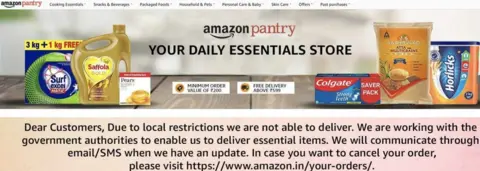
Dairy-and-produce delivery app Milk Basket said it was forced to dump 15,000 litres of milk and 10,000 kg of vegetables on Monday as its "staff, vendors and vehicles [were] being pushed back from the roads by local police".
Pradeep Kumar Mittal, who works with a milk delivery app, said he had been stopped by the police several times.
"I had to beg and plead at several check points and I felt humiliated. But now I have a pass and it has made things a bit easier," he said.
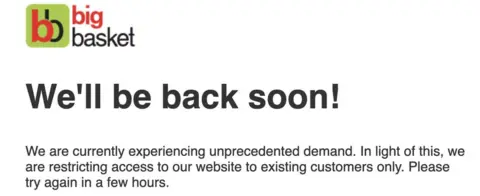
But not every vendor has a pass. India's bureaucracy is now under mounting pressure to ensure doorstep deliveries get through.
Otherwise there is a risk of panic and overcrowding in shops that are allowed to open.
When Mr Modi announced the lockdown on Tuesday night, people poured into shops, ignoring social distancing.
K Ganesh, co-promoter of produce delivery app Big basket as well as medical equipment firm Portea, said the lockdown was the right decision because there was no other option.
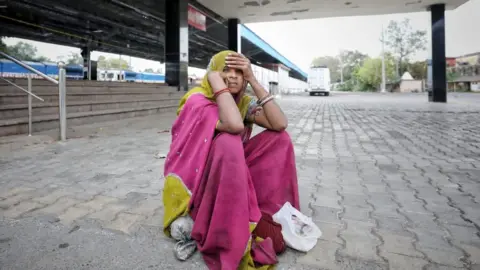
"How does a policeman understand the necessity of the service? By nature, he is used to seeing a pass or a permit and if he does not see it, he thinks you are a crook and he beats you up," he told BBC Hindi.
Two Portea executives who were carrying medical equipment were allegedly beaten up by the police in Kerala and Uttar Pradesh states.
Another executive was arrested for breaking the curfew. He is now out on bail.
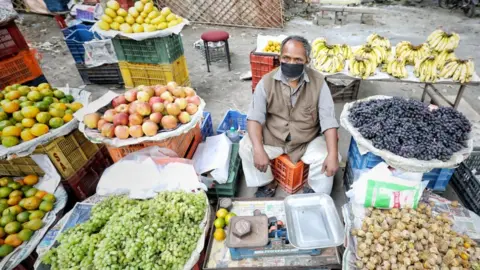
"We are sitting in our homes and there are [delivery] guys who are trying to help people. Instead of going to their villages, they are ready to go out and work, but they are caught and beaten up," he said.
Authorities have said those delivering essential services will not be stopped, but challenges remain.
Some of the apps are back online, but only partially. Many workers have abandoned the cities and towns they work in to return to their villages - sometimes on foot as public transport has been suspended.
But many others are soldiering on despite the added burden. All they ask for is to be allowed to do their jobs.
As Suresh Shah put it: "You don't beat up the people who are trying to feed you."
